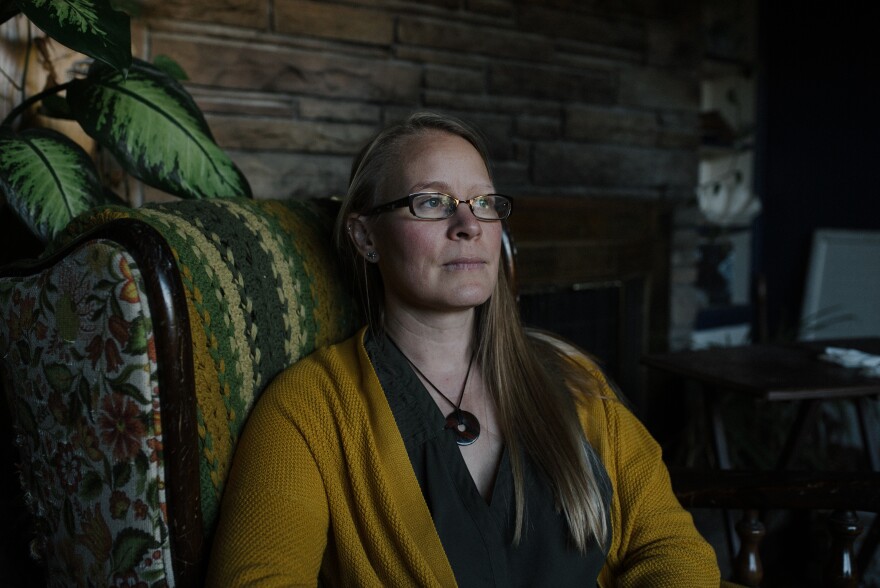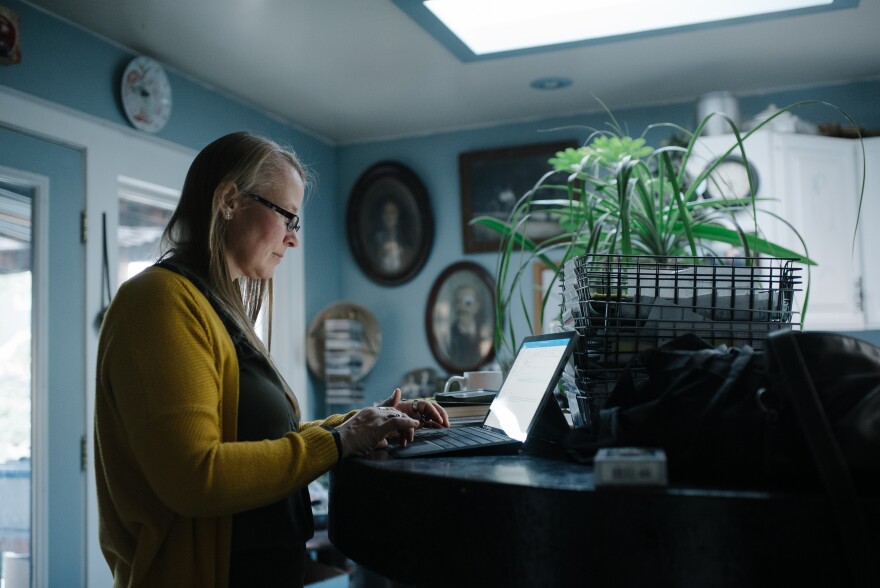Michele Jones likes to believe she's pretty good at spotting students who are struggling.
The 41-year-old math teacher at Cyprus High School in Magna is quick to notice when homework gets sloppy or a student misses class. But with Dustin Drage, a quiet freshman with a penchant for art, drawing and doodling, there weren't the typical red flags.

Drage was in class most days and when he was there he did his work.
That was three years ago and 15-year-old Drage was still living at home with his parents. That was before he had to escape a homelife that was not safe, and became homeless, even if he didn't see himself that way.
In Utah there are more than 15,000 confirmed homeless school-age kids. But many of these youth, like Drage, don't see themselves this way. For some, it's more complicated than that.
Drage said home life has never been easy for him.
Growing up, his family moved from place to place, often staying at motels for large chunks of time. His parents were drug addicts and alcoholics, which meant that most days, he had to fend for himself. Cook for himself. Get himself to school.
His parents were also unpredictable, often lashing out at Drage both verbally and physically.
Initially Jones wasn't aware of what Drage's homelife was like. She got to know Drage better during his sophomore year. He would often hang out in Jones' classroom with his friends during lunchtime. She and Drage would talk music sometimes, or she'd ask about his classes. But mostly he just seemed to need a place to retreat to during and after the school day.
Then, one night, Jones got an email from Drage. He said he was depressed and suicidal. She sent back a response right away, asking him to meet at her classroom first thing in the morning. He did and they talked but he didn't share much about his homelife. He didn't talk about the abuse, or about feeling unsafe.
Looking back, Drage said it was hard to ask for help.
"Maybe it was pride," he said.
A Nudge
Whatever it was, Drage wasn't about to unload on Jones. That is, until he got a nudge.
His girlfriend at the time would also hang out in Jones' classroom after school. One afternoon, Jones was about to shoo the two of them out so she could get some work done when she could tell something was amiss. Drage's girlfriend didn't want him to walk out the door.
As Jones remembers it, Drage's girlfriend pushed him forward.
"Tell Mrs. Jones," she said.
Drage stammered a bit, but then said the words that would put his life on a completely new trajectory.
"My dad is throwing beer bottles at my head."

Jones knew Drage was struggling but she had no idea how turbulent his life was outside of school. That night she helped Drage make a plan to stay with his older brother in Salt Lake City, which he did. But that was a 20-minute drive away, which made getting to school difficult. Eventually Drage ended up back at home.
A few months later, on the last day of Drage's sophomore year, everything blew up. His dad came home that night in a rage and immediately started fighting with Drage.
Drage said his dad smashed his head against the wall. The teen fought for his life, punching frantically. After they were both bloodied and bruised, Drage called the police and ended up at a hospital with his parents.
But he didn't know where to go from there. He didn't know who to call — other than his teacher. Drage told Michele he needed help and asked her to come pick him up.
Jones arrived with her husband. They spoke with Drage's parents, the police, a social worker. Jones was astonished that there was no plan for Drage. All he was told was that he couldn't be under the same roof as his father because of a restraining order.
"Dustin is left with a fractured clavicle and no place to go," Jones said.
That's how their summer of 2017 began.
Emancipation
Soon, Drage moved back in with his brother. That quickly became another bad situation for the same reasons Drage had left home — addiction and abuse.

The Jones helped him connect with a group of their friends, and he started couch surfing. He took a job at a restaurant and filed for emancipation, which is basically a minor legally separating from their parents.
Jones helped him through the process, paid the $50 fee and drove him to the hearing. The judge didn't need much convincing.
Eventually Drage started getting assistance from Salt Lake School District too. Like most students in his shoes, Drage didn't see himself as qualifying for any special assistance.
For youth in Drage's situation, this is typical. Mike Harman, the homeless liaison for the Salt Lake City School District, said that homeless students don't often call themselves "homeless."
"They often think they're going to get in trouble or we're going to call the authorities because they don't live with their parents," Harman said. "They try to stay on the underground."
Harman's job is to find homeless students — there are more than 800 in the district, including Drage — and use federal funding to help them. Under a federal law called the McKinney-Vento Act, any student who is struggling with finding a consistent place to live qualifies for services.
The services include anything that is school related. That could be clothing, school supplies, transportation assistance or personal hygiene items.
"I needed a parental figure"
But Drage was realizing there was something he needed that was beyond that scope.
"I needed a parental figure in my life," Drage said.
Drage asked Jones to meet up for coffee. He said he had a favor to ask: he wanted to move in with her and her family.
The primary reason, Drage told her, was that he wanted someone to keep him on track with his grades. Someone who would do that parental check in every night. "Where are you?" "Is your homework done?"

Jones said that both the teacher and parent in her couldn't say no to that. So she checked with her husband and they agreed, Drage should move in.
Drage was fortunate to know a teacher — a person — like Michele Jones.
Had Jones not been in his life - or not had that nudge from his girlfriend - Drage has some ideas of what would have happened to him. He thinks there's a chance he could have figured out another way to get on the right path. Or, more likely, he would have slipped up.
"I could have let my depression take over completely and become like a heroin addict on the streets and just give up," Drage said.
When Drage talks like this, it's not hyperbole. He's simply describing what he has seen happen to his own friends and family.
Drage said his upbringing is a big part of why it was hard for him to ask for help. He said growing up in an abusive household you don't feel deserving of help.
"Basically you just tell yourself, 'I'm not worth anything. So, no one's gonna help me. I'm not worth the help,'" Drage said.
Through this whole ordeal, Drage has told Jones something over and over again: How am I going to pay you back?
Eventually she came up with a good response.
"What I started saying was, and it's still true," Jones said. "He's going to pay me back by graduating."



